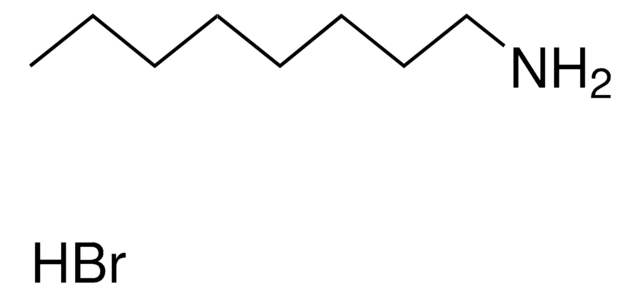912875
n-Dodecylammonium bromide
Synonym(s):
1-Dodecanamine, Greatcell Solar®, Hydrobromide (8CI) dodecylammonium bromide, Hydrobromide (9CI) dodecylamine, NDDAB
Sign Into View Organizational & Contract Pricing
All Photos(1)
About This Item
Empirical Formula (Hill Notation):
C12H28BrN
CAS Number:
Molecular Weight:
266.26
MDL number:
UNSPSC Code:
12352101
NACRES:
NA.23
Recommended Products
form
powder
Quality Level
color
white
InChI
1S/C12H27N.BrH/c1-2-3-4-5-6-7-8-9-10-11-12-13;/h2-13H2,1H3;1H
InChI key
VZXFEELLBDNLAL-UHFFFAOYSA-N
Related Categories
Application
Organohalide based perovskites have emerged as an important class of material for solar cell applications. The variations/substitution in organohalide cations and anions is employed for the optimization of the band gap, carrier diffusion length, and power conversion efficiency of perovskites based solar cells.
n-DABr is a precursor in perovskite solar cells which improves the solar cell efficiency due to greater passivation effect particulary on 1.72 eV bandgap perovskite.
Legal Information
Product of Greatcell Solar Materials Pty Ltd.
Greatcell Solar is a registered trademark of Greatcell Solar Materials Pty Ltd.
Greatcell Solar is a registered trademark of Greatcell Solar Materials Pty Ltd.
Greatcell Solar is a registered trademark of Greatcell Solar
Storage Class Code
11 - Combustible Solids
WGK
WGK 3
Flash Point(F)
Not applicable
Flash Point(C)
Not applicable
Choose from one of the most recent versions:
Certificates of Analysis (COA)
Lot/Batch Number
Sorry, we don't have COAs for this product available online at this time.
If you need assistance, please contact Customer Support.
Already Own This Product?
Find documentation for the products that you have recently purchased in the Document Library.
High Efficiency and High Open Circuit Voltage in Quasi 2D Perovskite Based Solar Cells.
Cohen B E, et al.
Advances in Functional Materials, 27(5), 1604733-1604733 (2017)
Lingling Mao et al.
Journal of the American Chemical Society, 139(14), 5210-5215 (2017-03-18)
Hybrid inorganic-organic perovskites are developing rapidly as high performance semiconductors. Recently, two-dimensional (2D) perovskites were found to have white-light, broadband emission in the visible range that was attributed mainly to the role of self-trapped excitons (STEs). Here, we describe three
Eran Edri et al.
The journal of physical chemistry letters, 4(6), 897-902 (2013-03-21)
Mesoscopic solar cells, based on solution-processed organic-inorganic perovskite absorbers, are a promising avenue for converting solar to electrical energy. We used solution-processed organic-inorganic lead halide perovskite absorbers, in conjunction with organic hole conductors, to form high voltage solar cells. There
Our team of scientists has experience in all areas of research including Life Science, Material Science, Chemical Synthesis, Chromatography, Analytical and many others.
Contact Technical Service








![[6,6]-Phenyl C61 butyric acid methyl ester ≥99%](/deepweb/assets/sigmaaldrich/product/structures/359/221/d990c746-0960-4c69-bf76-fe09b193824d/640/d990c746-0960-4c69-bf76-fe09b193824d.png)